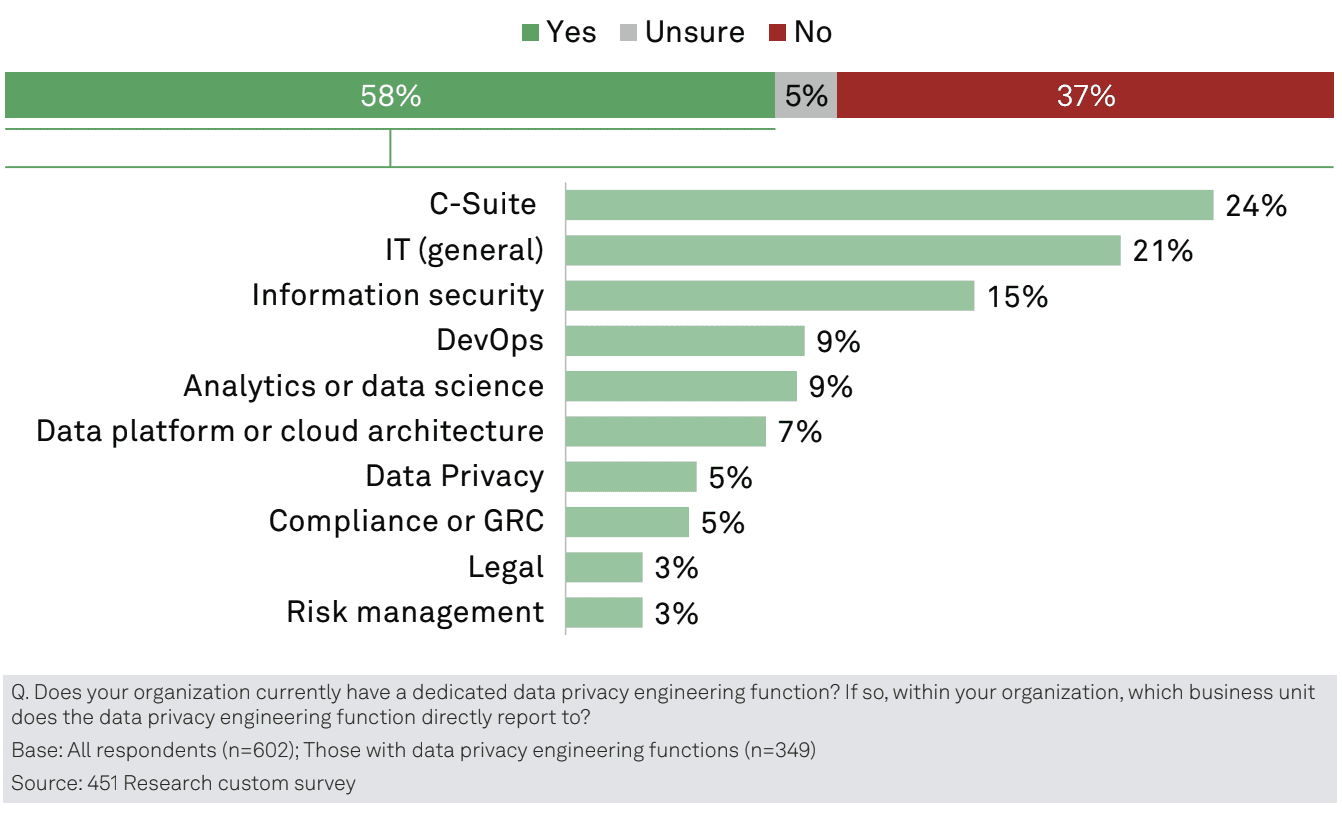The Data Policy Management Report
Immuta and S&P Global’s 451 Research surveyed 600 data professionals to get an inside look at the state of data policy management.


Do you have complete confidence in your organization’s privacy law compliance? If your answer is no, you’re in the majority. According to the International Association of Privacy Professionals (IAPP), only 20% of respondents report being fully confident in their company’s approach to data privacy compliance.
But data privacy concerns aren’t subsiding anytime soon – if anything, they’re growing more acute. So, what can we do to improve trust for the other 80%?
Privacy engineering is emerging as a critical way to enhance data privacy practices and adhere to compliance laws and regulations. By embedding privacy principles directly into system architecture and design, privacy engineering allows you to proactively address cloud data protection concerns, and build trust and confidence in your data. In this blog, we’ll explore how to incorporate it into your data security strategy.
Privacy engineering is a development function that integrates privacy measures into data platforms and ecosystems. The National Institute of Standards and Technology (NIST) defines it as:
“A specialty discipline of systems engineering focused on achieving freedom from conditions that can create problems for individuals with unacceptable consequences that arise from the system as it processes PII.”
Privacy engineering aligns directly with the concept of privacy by design, by integrating privacy considerations into data workflows from square one. With practices like data anonymization, minimization, and secure storage built in, you ensure that privacy is not an afterthought – it’s a fundamental design element. This allows you to maintain proactive sensitive data protection, helping avoid reactionary responses to data breaches, leaks, or other adverse events.
We mentioned a few key aspects of privacy engineering, but the following core principles are essential when developing a privacy engineering function:
Privacy engineering is still an emerging component of the modern data stack. So, it’s not entirely surprising that only a slight majority of respondents (58%) surveyed by Immuta and S&P Global’s 451 Research reported that their organization has established a dedicated privacy engineering function. Privacy-specific functions are becoming more prevalent – but there is still a long way to go before they are fully developed and widely adopted.
The relative newness of privacy engineering is evident in the lack of consistent reporting structures at the surveyed organizations. When asked which business unit their privacy engineering staff reports to, respondents’ pointed to the C-Suite (24%), IT (21%), Information Security (15%), and DevOps (9%), among others. It’s clear that while organizations are gradually implementing privacy engineering, they have not yet fully formalized it.

It’s clear that privacy engineering is playing an increasingly important role in modern data strategies. But how does it help bolster data security?
Privacy engineers act as the first line of defense in maintaining compliance with data regulations. They help build and maintain data architectures and logical processes with privacy baked in. This includes implementing controls that correspond directly to relevant regulations, rules, industry standards, and contractual agreements. With an engineering mindset, they also ensure controls are streamlined in order to minimize disruptions to end users’ standard workflows. By serving as a point person for enforcing compliance rules, privacy engineers play a key role in avoiding fines, legal action, and lost customer trust.
Beyond compliance, privacy engineers also act as subject matter experts, bridging the gap between regulatory requirements and product development. It’s not necessarily common for legal teams to have extensive technical knowledge, nor for engineering teams to fully understand privacy law. By acting as a conduit between legal/compliance officers and engineers/developers, privacy engineers ensure objectives are aligned and set up for success across teams.
Ultimately, data security is the responsibility of many teams. When privacy engineers focus specifically on building privacy-by-design into data ecosystems as a foundational element, it’s easier to implement security across the board.
As with any role or function, empowering privacy engineers may require revisiting your team’s skills and structure. In the Data Policy Management Report, 64% of survey respondents said the best way to support the privacy engineering function is to provide upskilling opportunities, followed by setting specific hiring objectives (57%). Without the right people and skills in place, the privacy engineering function will never have a meaningful impact.
Concurrently, it’s important to understand how privacy engineering will fit into your organizational structure. A high-level review of your data strategy will help inform this, helping to decide whether the role becomes an offshoot of an existing team or an entirely new internal group. Regardless of what makes the most sense for your company, the function needs adequate resources – only 49% of privacy engineering teams reported having a dedicated budget and tools, making their objectives harder to attain. Resourcing the team early on will expedite their progress toward having a tangible business impact.
Lastly, adopting a comprehensive data security platform will provide immense support for privacy engineering objectives by enforcing data access controls and dynamic data masking across connected data sources. The Immuta Data Security Platform allows you to discover, secure, and monitor the sensitive data across your data ecosystem, and offers native integrations with leading platforms such as AWS, Databricks, and Snowflake.
To secure and protect the privacy of your data, Immuta allows you to build and enforce easy-to-comprehend plain language policies, so that privacy engineers, legal teams, and software developers can all understand them – no SQL expertise required. Policies are automatically and dynamically enforced across your data stack with Immuta’s attribute-based access control, so built-in privacy requirements are applied regardless of where a query is taking place. User queries are automatically logged to create a comprehensive data audit trail, giving you total oversight and simplifying compliance.
To learn more about the growing importance of privacy engineering and other data security functions, download Immuta & 451 Research’s Data Policy Management Report. To see how simple it is to create security and privacy policies in Immuta, request a demo with our team.

Immuta and S&P Global’s 451 Research surveyed 600 data professionals to get an inside look at the state of data policy management.
Innovate faster in every area of your business with workflow-driven solutions for data access governance and data marketplaces.